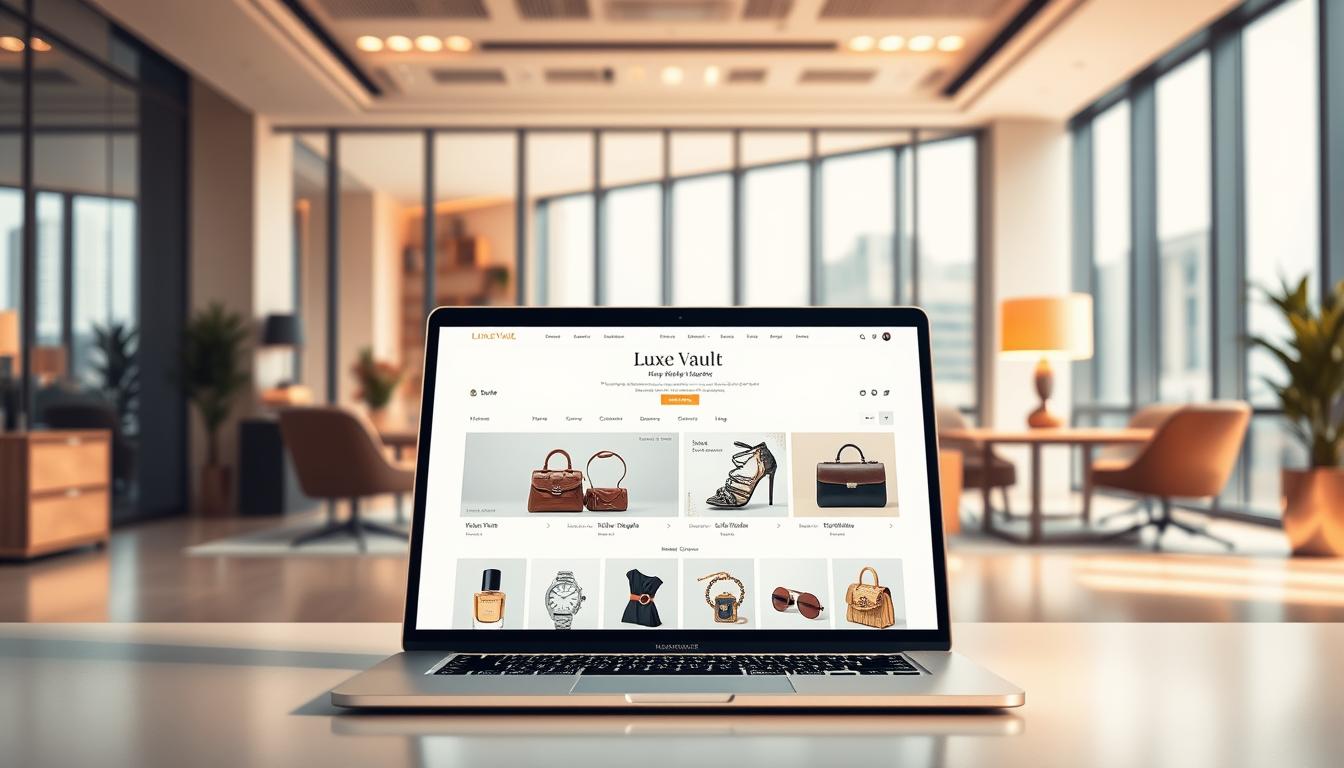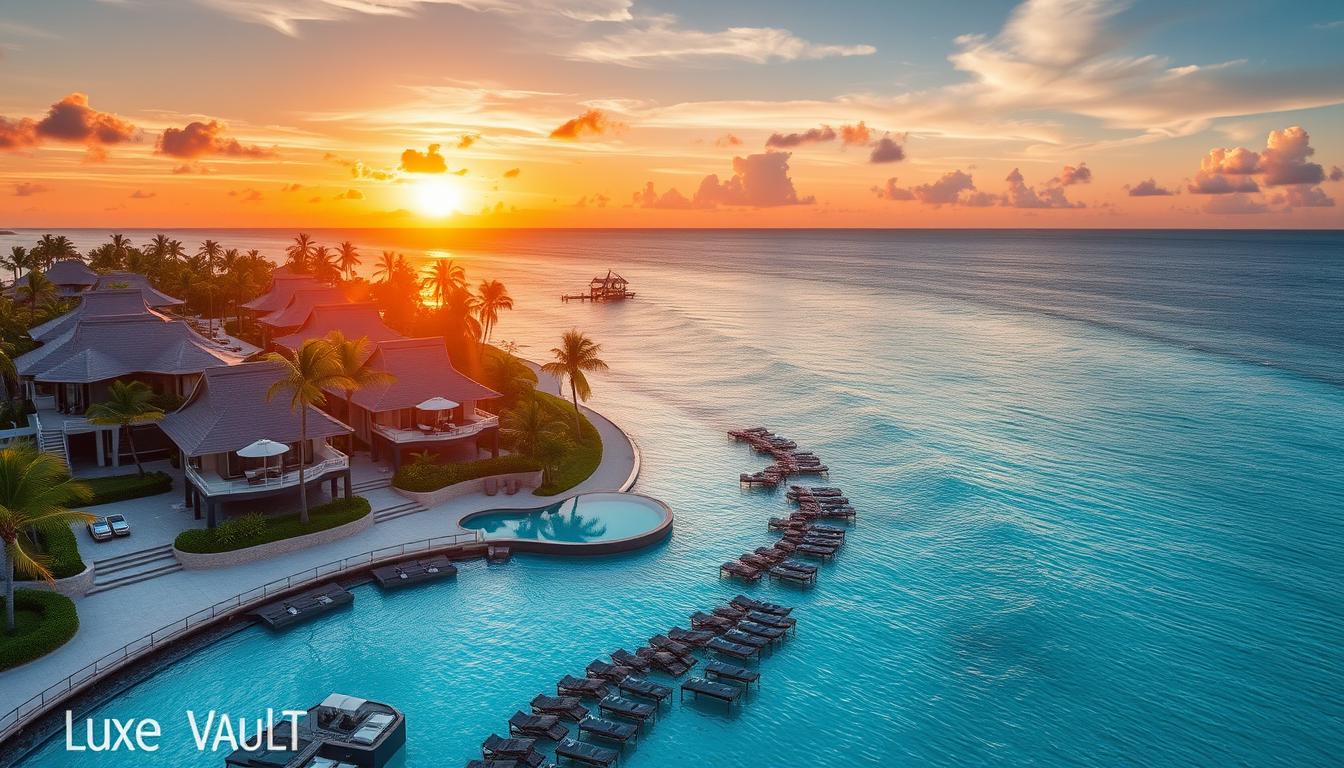In today’s digital landscape, luxury brands face a unique challenge: maintaining exclusivity while establishing a powerful online presence. With more companies leveraging digital platforms, it’s crucial for luxury brands to differentiate themselves.
At CoWrit Technologies Inc, we specialize in helping luxury brands navigate this complex digital world. Our suite of services includes AI applications, content writing, website design, and digital marketing, all tailored to elevate your brand’s digital footprint.
We’ll explore comprehensive strategies for luxury brands to enhance their digital presence while preserving their premium status. This guide will cover everything from understanding the luxury market to implementing cutting-edge digital strategies.
Key Takeaways
- Understand the unique challenges luxury brands face in the digital landscape.
- Learn how to maintain exclusivity while establishing a strong online presence.
- Discover comprehensive strategies for elevating your luxury brand’s digital footprint.
- Explore the importance of premium content and digital marketing for luxury brands.
- Find out how CoWrit Technologies Inc can help your luxury brand thrive online.
The Essence of Luxury Branding in the Digital Age
The essence of luxury branding in the digital age lies in its ability to merge heritage with modernity. As luxury brands navigate the online world, they must balance their traditional values with the demands of a digital audience.
Defining True Luxury in the Online Space
True luxury products are characterized by their exceptional quality, craftsmanship, exclusivity, and high price points. They often embody heritage, tradition, and superior materials. To translate these hallmarks into the digital realm, luxury brands must focus on creating immersive online experiences that reflect their premium identity.
Luxury brands thrive on their reputation for exclusivity, achieved through limited product releases, bespoke services, and maintaining a sense of mystery around the brand. As Jean-Marie Farina, the founder of the House of Farina, once said, “The art of perfumery is not just about creating fragrances, but about crafting an experience that evokes emotions and memories.” This quote highlights the importance of creating emotional connections with customers, a principle that applies to all luxury brands.
| Key Elements | Description | Digital Implementation |
|---|---|---|
| Exclusivity | Limited product releases, bespoke services | Exclusive online content, limited-edition digital products |
| Craftsmanship | Superior materials, skilled artisans | Behind-the-scenes content, showcasing craftsmanship |
| Heritage | Tradition, history, brand legacy | Digital storytelling, historical content, brand museums |
The Unique Challenges Luxury Brands Face Online
The digital age presents unique challenges for luxury brands, including maintaining exclusivity while reaching a broader audience and conveying quality through digital touchpoints. To overcome these challenges, luxury brands must adopt strategies that preserve their premium positioning while adapting to the democratizing nature of the internet.
Understanding the difference between true luxury, affordable luxury, and premium brands is crucial for developing appropriate digital marketing strategies. By creating digital experiences that mirror the exceptional quality and attention to detail found in luxury products themselves, luxury brands can maintain their prestige while embracing digital transformation.
Crafting a Distinctive Luxury Brand Identity Online
To elevate their online presence, luxury brands need to focus on creating a distinctive and consistent brand identity. This involves translating their heritage, values, and unique selling propositions into compelling digital content that resonates with discerning consumers.
Communicating Brand Heritage and Values
Luxury brands often have rich histories and stories that add depth and authenticity to their products. Storytelling is a powerful tool for luxury brands online, allowing them to communicate their brand’s history, craftsmanship, and values in ways that create emotional connections. By sharing these narratives, luxury brands can create a deeper connection with customers and reinforce their prestigious image.
For instance, consider the luxury fashion brand, Gucci. Their brand heritage is deeply rooted in Italian craftsmanship and a sense of timeless elegance. By highlighting these aspects through storytelling, Gucci creates an emotional connection with its customers.
“The art of luxury is not just about creating products, but about crafting experiences that resonate with our customers on a deeper level.”
Creating a Consistent Visual Identity Across Digital Platforms
Maintaining visual consistency across all digital platforms is crucial for luxury brands. This includes ensuring that the brand’s visual identity—such as typography, color palette, imagery style, and overall aesthetic—reflects the premium nature of their products or services.
| Visual Element | Description | Example |
|---|---|---|
| Typography | Custom-designed fonts that convey luxury and sophistication | Gucci’s use of a custom sans-serif font |
| Color Palette | Limited color schemes that evoke exclusivity and high-end quality | Chanel’s signature use of black and white |
| Imagery Style | High-quality images that showcase craftsmanship and attention to detail | Louis Vuitton’s use of high-resolution product images |
By focusing on these elements, luxury brands can create a consistent visual identity that reinforces their luxury status across all digital platforms.
Designing a Standout Luxury Website
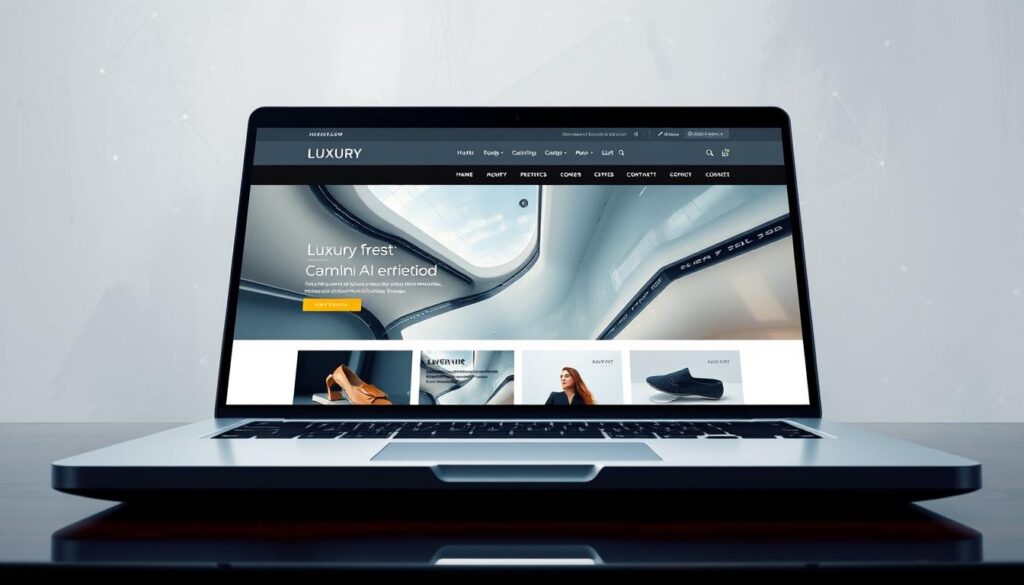
The website of a luxury brand serves as a digital ambassador, reflecting the brand’s values and exclusivity. In the digital age, a luxury brand’s website is often the first point of contact with potential customers, making its design crucial.
Essential Elements of Luxury Website Design
A luxury website’s design should incorporate sophisticated typography, a refined color palette, and high-quality visuals to convey the luxury and premium nature of the brand. The user interface should be intuitive, ensuring a smooth and enjoyable browsing experience.
High-resolution images, videos, and immersive content can captivate visitors and convey the brand’s story and values. Virtual tours, behind-the-scenes videos, and detailed product showcases can all enhance the online experience, creating a sense of exclusivity.
Balancing Exclusivity with User Experience
To effectively showcase products, luxury websites should utilize high-resolution imagery, 360-degree views, and immersive content that highlights craftsmanship and details. The loading speed and performance of the website are crucial factors that impact the perceived quality of the luxury brand online.
Balancing aesthetic sophistication with functional usability is key to creating a website that both impresses visitors and converts them into customers, providing an exceptional customer experience. By achieving this balance, luxury brands can create a digital presence that mirrors the personalized service customers would receive in a physical luxury retail environment.
Enhancing Your Luxury Brand’s Online Presence Through Strategic Content
Enhancing your luxury brand’s online presence requires a deep understanding of your target audience and a strategic content approach. We will explore how strategic content creation can significantly enhance your luxury brand’s online presence and engage your target audience more effectively.
Effective storytelling has always been a cornerstone of luxury branding. By leveraging interactive features and immersive narratives, luxury brands can create a deeper emotional connection with their audience.
Storytelling Techniques for Luxury Brands
Storytelling is particularly powerful for luxury brands, allowing you to communicate your heritage, craftsmanship, and values in ways that create emotional connections with consumers. Techniques for creating compelling brand narratives include:
- Highlighting the craftsmanship and attention to detail that goes into each product
- Sharing the history and heritage of the brand
- Showcasing the brand’s values and mission
By using these techniques, luxury brands can differentiate themselves from competitors and create a lasting impression on their audience.
Creating High-Quality Visual Content
High-quality visual content is essential for conveying the premium nature of luxury products or services. This includes professional photography, videography, and CGI. A well-crafted visual content strategy can help justify premium pricing and build brand appreciation.
| Visual Content Type | Description | Benefits |
|---|---|---|
| Professional Photography | High-resolution images showcasing products or services | Conveys luxury and premium quality |
| Videography | Videos highlighting brand stories, products, or craftsmanship | Creates emotional connections and showcases brand heritage |
| CGI | Computer-generated imagery for product visualization or brand storytelling | Enhances visual appeal and provides immersive brand experiences |
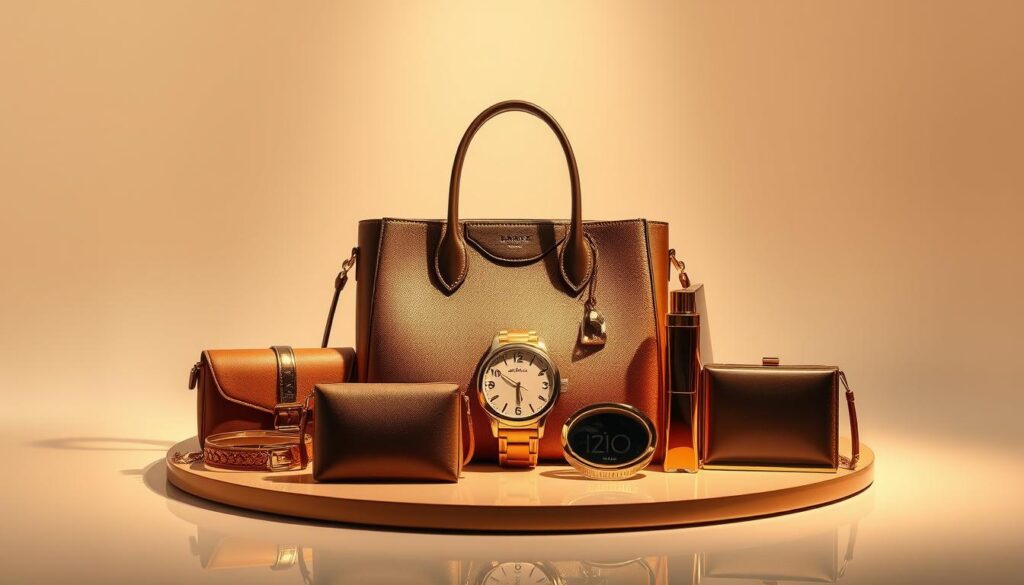
By incorporating these visual content types into their strategy, luxury brands can create a sophisticated online presence that resonates with their target audience.
Leveraging Social Media Platforms for Luxury Marketing
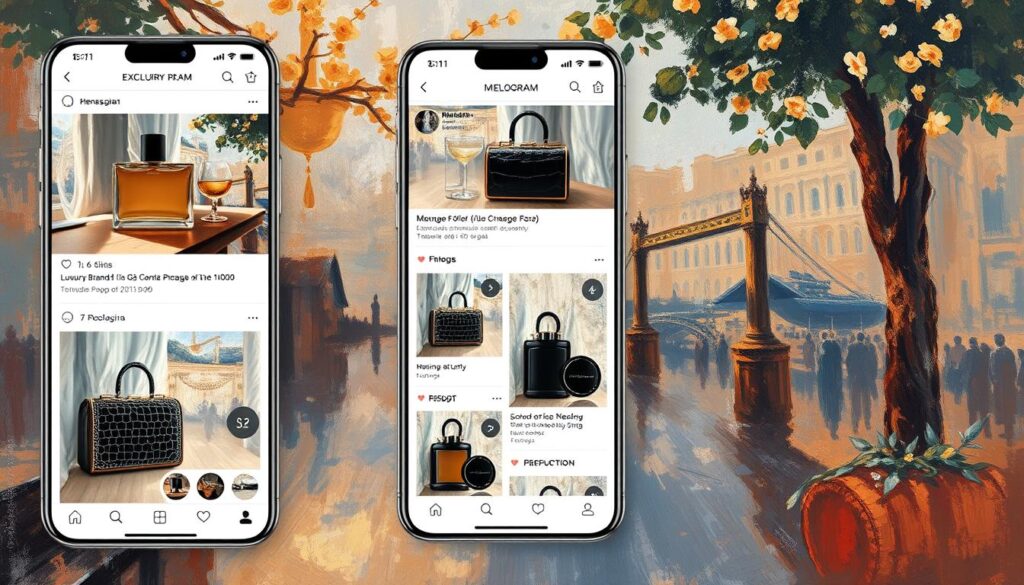
The rise of social media has revolutionized the way luxury brands market themselves, offering unprecedented opportunities to engage with their target audience. Social media platforms have become essential channels for luxury brands to showcase their products, share their stories, and connect with their discerning clientele.
We explore how different social media platforms can be leveraged for luxury marketing, with specific strategies tailored to each platform’s unique features and audience. By understanding the strengths of each platform, luxury brands can create a robust online presence that elevates their brand and resonates with their audience.
Instagram Strategies for Luxury Brand Elevation
Instagram has emerged as a powerful platform for luxury brand marketing due to its visually-driven nature and wide user base. To effectively utilize Instagram, luxury brands should focus on creating compelling visual content that showcases their products or services in an aspirational way. High-quality photography, curated aesthetics, and storytelling through captions can help create an engaging brand narrative.
By leveraging Instagram’s features like Stories, Reels, and IGTV, luxury brands can create diverse content that elevates their brand and connects with affluent consumers. For instance, behind-the-scenes content, sneak peeks, and exclusive promotions can foster a sense of exclusivity and encourage audience engagement.
Utilizing Facebook for Luxury Brand Promotion
Facebook, with its massive user base and robust advertising capabilities, provides an excellent platform for luxury brand promotion. Luxury brands can create engaging content such as videos, articles, and infographics to showcase their products, brand values, and unique selling points. By utilizing Facebook’s sophisticated targeting capabilities, luxury brands can reach specific demographic segments with tailored messaging and promotions.
To maximize their presence on Facebook, luxury brands should focus on creating high-quality content that resonates with their audience and encourages interaction. This can include hosting live events, sharing customer testimonials, and promoting exclusive offers.
LinkedIn for Luxury Brand Networking and Thought Leadership
LinkedIn, being a professional networking platform, can be a valuable tool for luxury brands to connect with industry professionals, establish thought leadership, and build business relationships. By sharing insightful content, participating in relevant discussions, and showcasing their expertise, luxury brands can position themselves as industry leaders.
For B2B luxury marketing, LinkedIn offers a unique opportunity to connect with potential partners, suppliers, and clients. Luxury brands can leverage LinkedIn’s publishing platform to share in-depth articles and thought leadership pieces that highlight their brand’s values and vision.
At Cowrit Technologies, we understand the importance of a well-crafted digital marketing strategy for luxury brands. Our expert digital marketing solutions can help elevate your luxury brand’s online presence and drive business growth.
The Power of Exclusivity in Digital Marketing
Digital marketing for luxury brands requires a delicate balance between showcasing exclusivity and maintaining accessibility. As we explore the concept of exclusivity in digital marketing, it’s crucial to understand how luxury brands can leverage this trait to enhance their brand image and customer loyalty.
Luxury brands thrive on their reputation for exclusivity, achieved through limited product releases, bespoke services, and maintaining a sense of mystery around the brand. The customer journey for a luxury brand should be seamless and personalized, with every touchpoint exuding sophistication and catering to the unique needs of each client.
Creating Limited Digital Experiences
Creating limited digital experiences is a powerful strategy for luxury brands. This can include time-limited content, exclusive online previews, or digital product drops that generate excitement and urgency among luxury consumers. By doing so, luxury brands can create a sense of digital scarcity that mirrors the exclusivity of physical luxury experiences.
- Limited-edition digital products
- Gated content
- Members-only online spaces
Invitation-Only Content and Virtual Events
Invitation-only content and virtual events can make the audience feel special and part of an exclusive community. By using digital channels to enhance the sense of exclusivity around product launches and special collections, luxury brands can reward their most loyal customers while incentivizing others to increase their engagement with the brand.
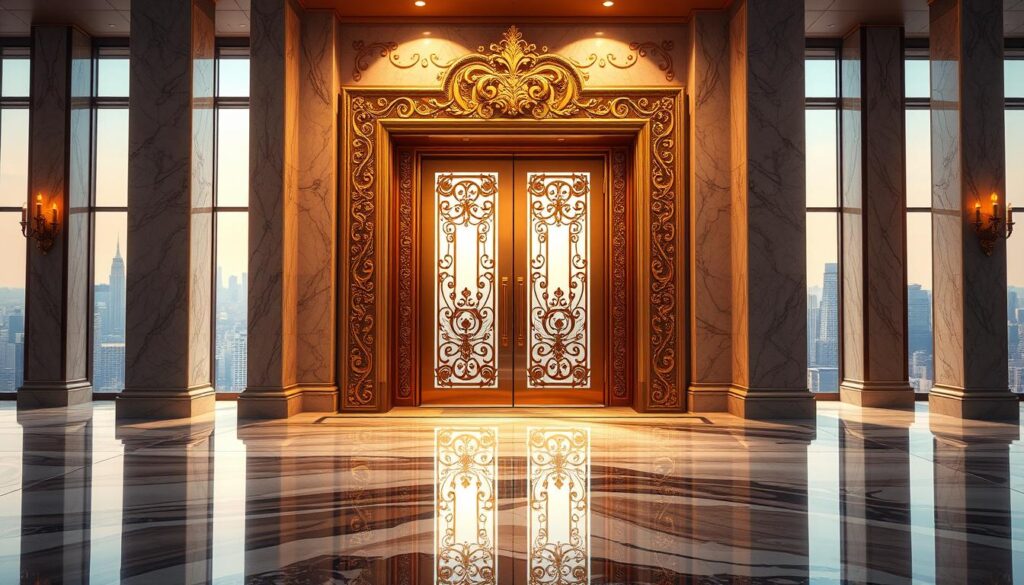
By balancing exclusivity with accessibility, luxury brands can attract new customers while maintaining their premium positioning. This balance is crucial for the long-term success of luxury brands in the digital landscape.
Personalization Strategies for Luxury Consumers
The key to unlocking loyalty among luxury consumers lies in the art of personalization, tailored to their unique preferences and behaviors. We recognize that luxury consumers expect a high level of service that is both personalized and exclusive.
To achieve this, luxury brands can leverage data analytics and AI to offer personalized recommendations and content to their visitors. This approach not only makes the customer feel valued and understood but also fosters loyalty and repeat business. By incorporating features like live chat, virtual consultations, and personalized shopping experiences, luxury brands can cater to the high expectations of their clientele.
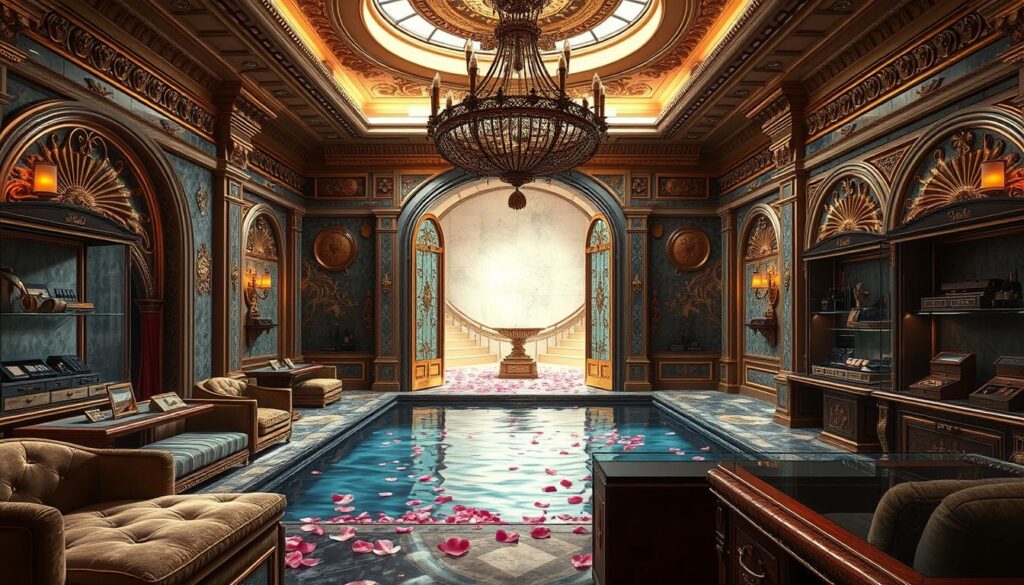
Tailoring the Digital Customer Journey
Tailoring the digital customer journey based on individual preferences, browsing history, and purchase behavior can significantly increase engagement and conversion rates. We can use data analytics to create personalized experiences that feel thoughtful rather than intrusive. This involves analyzing customer data to understand their needs and preferences, enabling us to offer relevant products and services.
By doing so, luxury brands can create a seamless and personalized experience across all touchpoints, from browsing to purchase and beyond.
Implementing Personalized Communication Channels
Implementing personalized communication channels—such as dedicated client advisors, personalized emails, and customized mobile notifications—can enhance the luxury service experience. AI-powered chatbots can also enable luxury brands to provide instant and personalized customer service on social media platforms, handling customer queries, offering product recommendations, and facilitating transactions.
By balancing automation with human touch, luxury brands can create memorable moments throughout the customer journey that strengthen brand loyalty and advocacy.
Harnessing Data Analytics for Luxury Brand Growth

To stay ahead in the luxury market, brands must harness the power of data analytics. By leveraging data insights, luxury brands can refine their marketing strategies, enhance customer experiences, and drive sales. Data analytics provides a comprehensive understanding of consumer behavior, preferences, and purchasing patterns, enabling brands to make informed decisions.
Key Metrics for Measuring Luxury Brand Performance
Understanding the right metrics is crucial for luxury brands to measure their performance accurately. Beyond standard e-commerce metrics, luxury brands need to track engagement quality, brand sentiment, and customer lifetime value. These metrics offer a more nuanced view of a brand’s success and help identify areas for improvement. For instance, a study on luxury brand performance metrics can be found in research papers such as those available at URI’s Digital Commons.
By focusing on these key metrics, luxury brands can gain a deeper understanding of their target audience and tailor their marketing efforts accordingly. This data-driven approach allows brands to optimize their strategies and improve overall performance.
Using Data Insights to Refine Luxury Marketing Strategies
Data insights are invaluable for refining luxury marketing strategies. By analyzing customer data, brands can identify which content, channels, and messaging resonate most with their target audience. This information enables brands to adjust their marketing strategies to better meet customer needs and preferences.
Moreover, predictive analytics can help luxury brands anticipate trends and consumer preferences, staying ahead of the competition. Implementing A/B testing for luxury digital experiences can also optimize website design, email campaigns, and other marketing initiatives while maintaining brand integrity.
Ultimately, balancing data-driven decision-making with the intuition and creativity that has traditionally guided luxury brand marketing is key to success. By combining these approaches, luxury brands can create effective marketing strategies that drive sales, enhance customer experiences, and foster brand loyalty.
Influencer Marketing for Luxury Brands

Influencer marketing has become an indispensable tool for luxury brands seeking to elevate their online presence and resonate with their discerning audience. By collaborating with influencers in the luxury industry, brands can tap into their large and engaged follower base to promote their products effectively.
Selecting the Right Influencers for Your Luxury Brand
Selecting the right influencers for your luxury brand involves looking beyond follower count to assess alignment with your brand values, audience demographics, and content quality. We’ll discuss the different types of influencers—from celebrities to micro-influencers—and how each can play a role in your luxury marketing strategy.
The key is to identify influencers whose values align with the brand’s image and target audience. By establishing authentic relationships with influencers, brands can create compelling content that resonates with their audience and drives engagement.
Creating Authentic Collaborations that Preserve Brand Integrity
Creating authentic collaborations that preserve brand integrity is essential for luxury brands, as consumers can easily detect forced or inauthentic partnerships. We’ll share strategies for developing long-term relationships with select influencers rather than one-off promotions, which can build deeper brand associations.
Measuring the impact of influencer marketing requires looking at metrics beyond immediate sales, including brand awareness, sentiment, and audience growth. We’ll explore innovative approaches to influencer collaborations, including co-created products, behind-the-scenes access, and experiential content.
Experiential Marketing in the Digital Realm
The digital realm offers luxury brands a unique opportunity to craft experiential marketing strategies that rival their physical counterparts. As technology continues to evolve, luxury brands can now create immersive and engaging experiences that captivate their audience in entirely new ways.
One of the most significant advancements in digital experiential marketing is the use of Virtual and Augmented Reality (VR/AR) experiences. These technologies allow luxury brands to showcase their products in a more interactive and engaging manner.
Virtual and Augmented Reality Experiences
Immersive AR experiences will enable luxury brands to showcase their products in a whole new dimension. From virtual showrooms to try-on features, AR provides consumers with a more engaging and interactive shopping experience. Brands can leverage AR filters and lenses on platforms like Instagram and Snapchat to create personalized content that aligns with their luxury aesthetic.
For instance, a luxury fashion brand could create an AR experience that allows customers to virtually try on their latest collection. This not only enhances the shopping experience but also provides valuable insights into customer preferences.
| Technology | Application in Luxury Brands | Benefits |
|---|---|---|
| AR Try-On | Virtual try-on for clothing and accessories | Enhanced customer experience, reduced returns |
| Virtual Showrooms | Immersive product showcases | Increased engagement, broader reach |
| Live Video Shopping | Real-time product demonstrations | Personalized interaction, immediate sales |
Digital Product Launches and Exclusive Online Events
Live video shopping is gaining momentum, offering luxury brands a unique opportunity to connect with their audience in real-time. Through live streaming, brands can showcase products, answer questions, and provide an exclusive behind-the-scenes glimpse into their world. Integrating e-commerce capabilities directly into live videos enables users to make purchases seamlessly, enhancing the convenience and immediacy of luxury shopping experiences.
Digital product launches and exclusive online events can generate excitement and create moments of connection with the audience, even when physical gatherings aren’t possible. By leveraging these digital experiences, luxury brands can maintain their exclusivity and high-end appeal while expanding their reach.
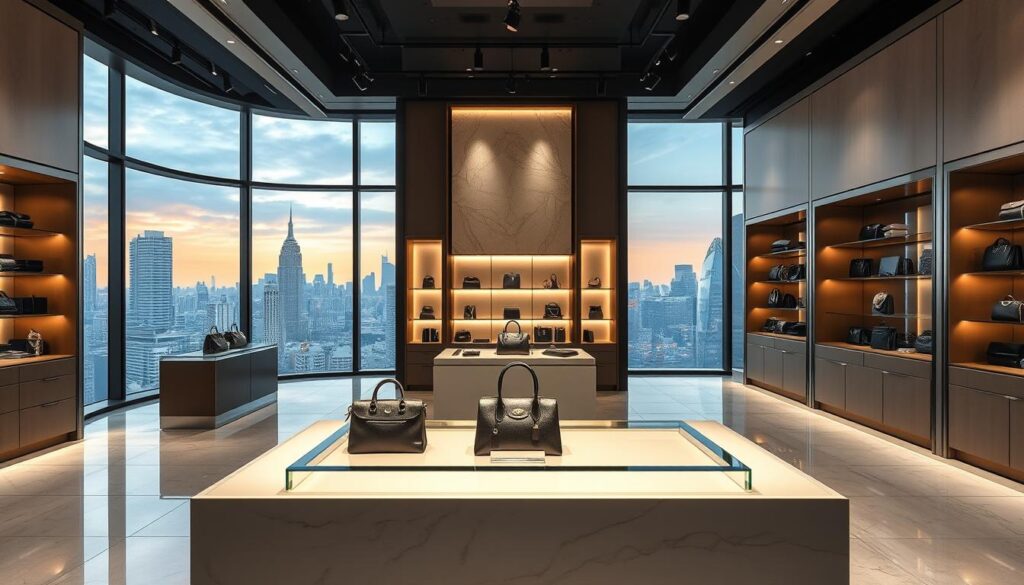
Balancing Online Presence with Offline Luxury Experiences
The key to success for luxury brands lies in seamlessly integrating their online presence with their offline luxury experiences. As we explore this integration, it’s essential to understand how luxury brands can create a harmonious relationship between their digital and physical presence.
To achieve this balance, luxury brands must focus on creating a unified brand experience that transcends both online and offline channels. This involves ensuring that every touchpoint, from website design to in-store service, exudes sophistication and caters to the unique needs of each client.
Creating Seamless Omnichannel Experiences
Creating seamless omnichannel experiences means ensuring consistent brand messaging, service quality, and personalization across all customer touchpoints. This can be achieved by implementing strategies that drive traffic to physical locations while using in-store experiences to enhance online engagement.
For instance, luxury brands can use digital channels to offer personalized content and promotions that encourage customers to visit their physical stores. Conversely, in-store experiences can be designed to drive online engagement, such as by providing customers with tablets to browse online collections or offering exclusive online content.
| Omnichannel Strategies | Online Implementation | Offline Implementation |
|---|---|---|
| Personalization | Targeted online ads | In-store personalized service |
| Consistent Messaging | Unified brand voice across digital platforms | In-store promotions aligned with online campaigns |
| Seamless Experience | Easy online-to-offline transitions | In-store access to online inventory |
Using Digital to Enhance In-Store Exclusivity
Digital tools can significantly enhance in-store exclusivity through appointment booking systems, personalized shopping experiences, and digital clienteling. By leveraging these technologies, luxury brands can create memorable brand experiences that customers can’t replicate online.
For example, luxury brands can use data collected online to inform in-store experiences, such as by offering personalized product recommendations or tailored promotions. This integration of online and offline data enables luxury brands to provide a truly integrated luxury customer journey.
Navigating Regulatory Challenges in Luxury Digital Marketing
As luxury brands continue to expand their digital footprint, they must navigate a complex landscape of regulatory challenges. The digital age has brought about increased scrutiny of marketing practices, particularly in the luxury sector where brand reputation and customer trust are paramount.
Regulatory compliance is crucial for luxury brands to maintain their integrity and avoid potential legal issues. We will explore the specific regulatory challenges that luxury brands face in digital marketing and how to navigate them while maintaining brand integrity.
Data Privacy Considerations for Luxury Brands
Luxury brands must prioritize data privacy, as their customers expect discretion and security when sharing personal information. Implementing robust data protection measures and complying with regulations like the General Data Protection Regulation (GDPR) and the California Consumer Privacy Act (CCPA) is essential.
To comply with these regulations, luxury brands should implement transparent data collection practices and ensure that customer data is handled responsibly. This includes providing clear information about data usage and obtaining explicit consent from customers.
Maintaining Transparency in Influencer Partnerships
Maintaining transparency in influencer partnerships is vital for building trust with consumers and complying with advertising regulations. Luxury brands should work with influencers who align with their values and ensure clear disclosure of sponsored content.
To achieve this, luxury brands can implement clear disclosure practices in their influencer marketing campaigns. This includes using hashtags like #ad or #sponsored and ensuring that the sponsored content is clearly labeled.
Future Trends in Luxury Digital Marketing
The luxury brand landscape is on the cusp of a revolution, driven by technological advancements. As we navigate this new era, luxury brands must stay ahead of the curve to maintain their exclusivity and appeal.
AI and Machine Learning are transforming the luxury digital marketing landscape. AI algorithms can analyze user behavior and preferences to deliver personalized content recommendations, ensuring that luxury brands reach the right audience with the right message at the right time.
AI Applications for Luxury Brands
AI is set to play a pivotal role in shaping the future of luxury social media strategies. By harnessing the power of AI, brands can enhance their marketing efforts through Intelligent Content Recommendation, Sentiment Analysis, and Reputation Management, as well as Chatbots for Seamless Customer Service.
| AI Application | Description | Benefit |
|---|---|---|
| Intelligent Content Recommendation | Analyzes user behavior to recommend content | Optimized user engagement and conversion rates |
| Sentiment Analysis and Reputation Management | Monitors and manages online reputation | Effective reputation management |
| Chatbots for Customer Service | Provides seamless customer service | Enhanced customer experience |
Emerging Platforms and Technologies
Emerging platforms and technologies, including the metaverse, NFTs, and blockchain, present new opportunities for luxury brands to create exclusive digital experiences and products. By leveraging these technologies, luxury brands can stay ahead of the competition and provide unique experiences for their customers.
As luxury brands navigate these emerging trends, they must balance technological innovation with timeless brand storytelling. By doing so, they can create a seamless and engaging brand experience that resonates with their target audience.
Measuring Success: KPIs for Luxury Brand Online Presence
Measuring the success of a luxury brand’s online presence requires a nuanced approach to KPIs. Traditional metrics may not fully capture the value of digital marketing for luxury brands, which often have longer consideration cycles and focus on brand building.
Engagement Metrics That Matter for Luxury Brands
For luxury brands, engagement metrics go beyond mere numbers. We consider the quality of engagement, including sentiment analysis and time spent with content. These metrics provide insights into how audiences interact with the brand online.
- Sentiment analysis to gauge audience feelings towards the brand
- Time spent on site or with specific content
- Depth of engagement, such as watching videos or exploring product details
Conversion Metrics Beyond Direct Sales
Conversion metrics for luxury brands should look beyond direct sales. We track appointment bookings, catalog requests, and store visits as indicators of successful online presence. These actions reflect a customer’s intent to engage further with the brand.
Conclusion: Partnering with Experts to Elevate Your Luxury Brand
The journey to enhancing your luxury brand’s online presence is multifaceted, involving various strategies and expert insights. We’ve explored numerous ways to maintain the exclusivity and prestige that define luxury brands in the digital age.
At CoWrit Technologies Inc, we offer comprehensive services tailored to luxury brands, including AI applications, content writing, website design, and digital marketing. Our team understands the unique challenges and opportunities that luxury faces online.
Contact us today via WhatsApp at +44-7822010953 to discuss how we can help elevate your brand‘s online presence and achieve lasting success across all digital platforms.
